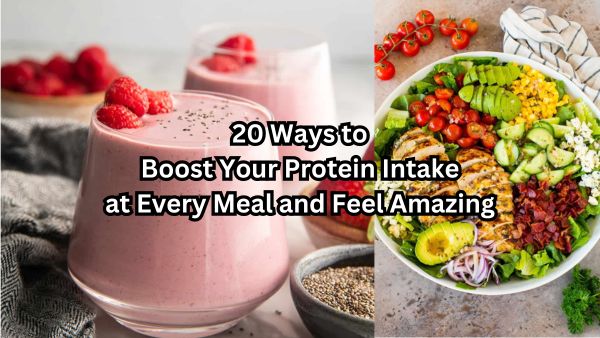20 Ways to Boost Your Protein Intake at Every Meal and Feel Amazing
In the World of nutrition, protein stands tall as a crucial macronutrient, serving as the building block for various bodily functions. Whether you’re an athlete aiming for muscle growth or simply seeking a balanced diet, incorporating adequate protein is paramount.
Breakfast Boosters
Kickstart your day with a protein-packed breakfast. Opt for options like Greek yogurt with berries, eggs with whole-grain toast, or smoothies blended with protein-rich ingredients like spinach, almond milk, and protein powder.
Lunchtime Protein Punch
Revamp your lunch routine by including protein sources such as grilled chicken, chickpeas, quinoa, or tofu in salads, wraps, or bowls. These options provide a substantial midday energy boost.

Snack Attack: High-Protein Snacks
For between-meal cravings, turn to snacks like nuts, hummus with veggies, hard-boiled eggs, or protein bars. These snacks not only satisfy hunger but also contribute to your daily protein intake.
Protein-Packed Dinners
Craft dinners centered around protein-rich foods like salmon, lean beef, lentils, or beans. Pair them with veggies and whole grains for a well-rounded meal.
Read More:- What is Childhood Diabetes ? 8 Ways to Cultivate Healthy Habits from an Early Age
Protein Beyond Meat: Vegetarian/Vegan Options
Explore plant-based protein sources such as tempeh, edamame, lentils, and quinoa for a diverse and nutrient-rich diet, even without animal products.
Hydration and Protein
Remember, hydration plays a key role in optimizing protein absorption. Ensure you’re drinking enough water to aid in the digestion and utilization of proteins.
Athletes’ Protein Requirements
Athletes have increased protein needs. Lean towards options like chicken, turkey, fish, and legumes to support muscle recovery and growth.
Protein Supplements: Pros and Cons
While protein supplements offer convenience, they shouldn’t replace whole food sources. Use them cautiously, understanding their role in meeting specific dietary needs.
Protein and Weight Loss
Incorporating protein into meals can aid in weight management by promoting feelings of fullness and supporting muscle mass while losing fat.
Cooking Techniques to Preserve Protein
Cook smartly! Avoid overcooking meats and consider grilling, baking, or steaming to retain maximum protein content in your meals.
Protein in Special Diets (Keto, Paleo, etc.)
Adapting to specialized diets doesn’t mean compromising on protein. Find suitable sources within the guidelines of your chosen dietary plan.
Children and Protein Requirements
Ensure children receive adequate protein for growth through options like lean meats, dairy, nuts, and legumes while focusing on varied and nutritious meals.
Elderly and Protein Intake
For older adults, protein remains crucial. Incorporate options like fish, eggs, dairy, and protein shakes to maintain muscle mass and overall health.
Final Words:
Protein is an essential nutrient that helps build and repair tissues, produce enzymes and hormones, and keep you feeling full. It’s especially important for athletes and people who are trying to lose weight or build muscle.
But getting enough protein can be a challenge, especially if you’re a vegetarian or vegan. Luckily, there are plenty of ways to sneak more protein into your diet without feeling like you’re eating the same boring meals all the time.
Related Job Updates
- Shocking Truth About Pumpkins: What You Don’t Know Will Amaze You!
- 10 Secret Tips for Managing Menopause Symptoms Without Medicine
Latest Job Posts
- TGTRANSCO Recruitment 2026: 250 Apprentice Posts for BE/BTech & Diploma
- UPSC Recruitment 2026: Apply Online for 349 Assistant Commandant Vacancies @upsc.gov.in
- GAIL Recruitment 2026: 70 Executive Trainee Vacancies, Apply Online from 20 Feb
- DSSSB Recruitment 2026: 911 Vacancies for JE, AE, Legal Assistant, Apply from 24 Feb
- RRB ALP Vacancy 2026: 11,127 Posts Approved – Notification Date & Eligibility
Important Sections:
All Jobs | Admit Cards | Results | Answer Keys | Homepage
